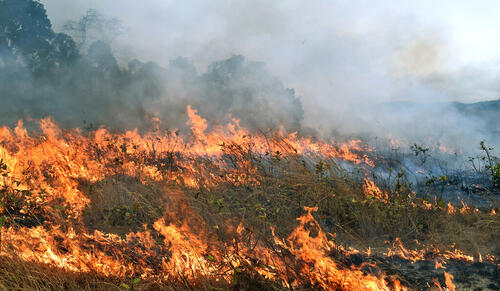
Global climate change has already exacerbated the risk of fire and is likely to fuel even more change as accelerating feedback loops create disastrous consequences for both biodiversity and human populations. Yet accurately predicting the risks and impact of bush and wildfire globally is still a work in progress.
In a new study, a team of Yale scientists and colleagues from South Africa, Gabon, and the United States set more than 1,000 prescribed fires in grassy savannas, an ecosystem where more than 80% of the world’s fire activity occurs. Using the results of the experimental blazes, they tested a model that will help climate scientists to more accurately predict when and where changes to the expected frequency and intensity of fires are likely to occur, and how they will impact global climate change. They report the results June 20 in the journal Proceedings of the National Academy of Sciences.
“Areas such as the American West and African savannas can suddenly switch from a nonflammable state to one where everything is burning, or vice versa,” said senior author Carla Staver, Associate Professor of Ecology and Evolutionary Biology at Yale & Associate Director at the Yale Institute for Biospheric Studies (YIBS). “Predicting when that threshold will be crossed is crucial to understanding the impact fires have now and will have in the future.”
The Yale team led by Anabelle Cardoso, a former Postdoctoral Associate in Staver’s lab who is now at the University at Buffalo, set fires in Kruger National Park, in South Africa, and other savannas in Africa and the United States. They then measured variables such as grassy fuel biomass, moisture levels, air temperature, and humidity, as well as seasonal variables such as rainfall. For more information, please click here for an article published by Yale News.



